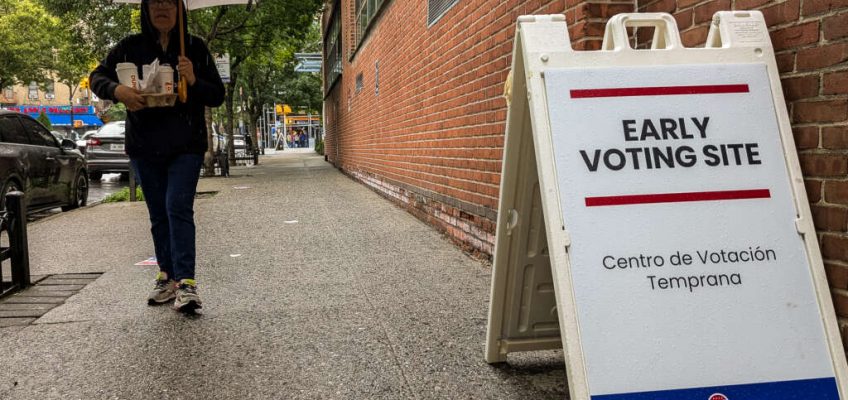Early voting kicks off Saturday in the general election—the culmination of what’s been a dramatic 2025 race for the city’s next mayor, where much of the conversation has centered around housing and affordability.
An early voting site in The Bronx during the June primaries. (Adi Talwar/City Limits)
Early voting kicks off Saturday in the general election—the culmination of what’s been a dramatic 2025 race for the city’s next mayor, where much of the conversation has centered around housing and affordability.
The cost of housing is the top issue New Yorkers want the city’s next leader to address, a recent voter survey found, followed by street homelessness. The survey, conducted by the nonprofit Community Service Society (a City Limits funder), questioned 2,000 city residents in September and October. Reducing crime and expanding access to mental health care were also top priorities.
“I wish that elected officials understood that public housing and even low income housing is still very high for renters to be able to afford,” one survey respondent wrote. “When your monthly rent is over half of your monthly salary, it’s impossible to get ahead,” said another.
The three mayoral candidates—Democratic nominee and Queens Assemblymember Zohran Mamdani; former Gov. Andrew Cuomo, running as an independent; and Guardian Angels founder and Republican Curtis Sliwa—have each laid out their own plans to address the housing crisis.
In addition to casting a vote for mayor and other elected officials, voters can flip their ballots to weigh in on six ballot measures, three of which modify the city’s process for permitting new housing.
Ballot proposal 1 would amend the New York State Constitution to allow new ski trails in Essex County, New York.
Ballot proposal 2 would fast track publicly financed affordable housing projects and affordable housing projects in the 12 city community districts with the lowest rates of affordable housing development.
Ballot proposal 3 would create a faster review for smaller housing projects that increase housing by less than 30 percent. It would also speed up review for some climate resiliency projects, like raising streets.
Ballot proposal 4 would allow a tribunal of the mayor, City Council speaker, and representative borough president to override City Council decisions that reject or change affordable housing projects.
Ballot proposal 5 would create a single digitized city map for planning.
Ballot proposal 6 would move election dates for city offices to the same year as federal presidential elections.
Proposals two through four, which touch on affordable housing, have generated significant debate. On one side, many housing groups and citywide public officials say that the changes will accelerate housing growth in the city.
“We have a system now that allows communities that are politically and economically powerful to stop housing,” said Manhattan Borough President and incoming comptroller Mark Levine in a rally for the housing proposals last week.
The City Council opposes the measures, saying they would weaken lawmakers’ ability to negotiate with developers to secure benefits for their districts in housing deals. “They eliminate communities’ power,” City Council Speaker Adrienne Adams countered in a rally earlier this month.
Cuomo has come out for the housing proposals. Sliwa has urged voters to vote no. Mamdani has yet to take a stance.
Early voting will run from Saturday, Oct. 25 to Sunday, Nov. 2. Election Day is Nov. 4.
Here are some helpful links if you’re headed to the polls this weekend:
Check here to make sure you’re registered to vote, or call 1-866-868-3692. The last day to register online or by mail is Saturday, Oct. 25. You can do so here. The last day to register in person at your county board of elections is Nov. 3.
Find your poll site and view a sample ballot here (note: your early voting site is typically a different location from your Election Day site).
If you experience trouble voting, call the Attorney General’s Election Protection Hotline at (866) 390-2992, or report an incident online here.
Here’s what else happened this week in housing—
ICYMI, from City Limits:
The number of homeless children attending New York City public schools increased again in 2024-2025, surpassing 150,000 for the first time. Here’s a look at the latest data by neighborhood.
The partial building collapse at NYCHA’s Mitchel Houses earlier this month is a grim reminder of the precarious state of the city’s public housing stock. But most NYCHA developments have the same or an even greater level of repair needs than those at Mitchel, a City Limits investigation found.
New Yorkers’ heating bill rates are going up. But a program that helps low-income households pay their winter utility costs is being delayed thanks to the government shutdown.
Last year, 4,655 New York City children under the age of 6 tested positive for elevated lead levels in their blood. Here’s what tenants should know about their risk of lead paint exposure.
ICYMI, from other local newsrooms:
A growing number of government subsidized and nonprofit-operated affordable housing developments are in financial distress, according a new analysis from the Association for Neighborhood and Housing Development, The City reports.
The Adams administration is looking to rezone a flood-prone neighborhood that straddles Brooklyn and Queens dubbed “The Hole,” the New York Times reports.
Efforts to expand rent stabilization beyond the five boroughs are hitting hurdles, according to City and State.
Climate disasters are among the factors driving migration to New York, according a Documented investigation.
To reach the reporter behind this story, contact Patrick@citylimits.org. To reach the editor, contact Jeanmarie@citylimits.org. Want to republish this story? Find City Limits’ reprint policy here.
The post Your Early Voting Guide, And What Else Happened This Week in Housing appeared first on City Limits.


Leave a Reply